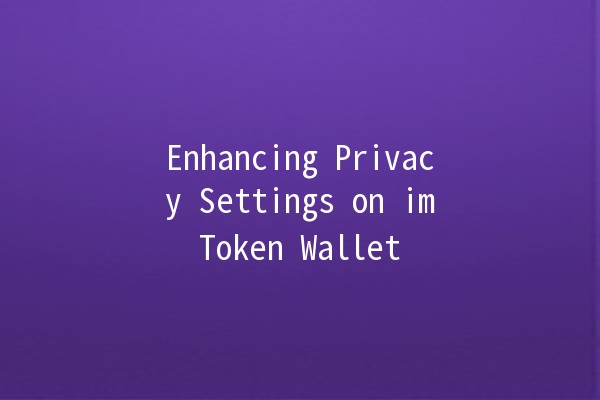In the digital age, where personal data is increasingly vulnerable to various threats, it's imperative for cryptocurrency users to prioritize privacy and security. One of the most widely used cryptocurrency wallets, imToken, offers a variety of privacy features that can help users protect their sensitive information. In this article, we will explore effective tips for enhancing privacy settings on your imToken wallet, providing practical examples and applications.
imToken provides a number of builtin security features that are essential for protecting your assets and data. Here’s how you can leverage them effectively:
Setting a strong password is the first line of defense against unauthorized access. It’s important to choose a complex password that avoids easily guessable phrases.
Application Example: When setting up your imToken wallet, ensure your password includes at least eight characters, combining upper and lower case letters, numbers, and special symbols like @, #, and $. This significantly decreases the likelihood of bruteforce attacks.

imToken supports twofactor authentication, which adds a second layer of security beyond just the password.
Application Example: After enabling 2FA, you will need to validate your identity with a code sent to your mobile device each time you log in. This means even if someone discovers your password, they cannot access your wallet without physical access to your phone.
Your recovery phrase (or seed phrase) is critical for accessing your wallet. It’s vital to ensure it is stored securely and privately.
Instead of keeping your recovery phrase on your mobile device or computer (which could be hacked), consider written physical copies.
Application Example: Write down your recovery phrase and store it in a secure location like a safe or bank safety deposit box. Avoid digital notes or screenshots, as these can be compromised.
Never disclose your recovery phrase to anyone, regardless of the situation. Legitimate services will never ask for this information.
Application Example: If you are approached by someone claiming to be a customer service representative, remind yourself that no reputable service should ever ask for your recovery phrase.
Keeping an eye on your transactions can help detect any unauthorized activity early on.
imToken offers notifications for transactions. Enabling this feature helps you receive instant alerts for any activities related to your wallet.
Application Example: You can set notifications that inform you of any incoming or outgoing transactions. This allows for immediate action if you notice unauthorized transactions.
Take time to frequently check your transaction history within the app. This helps you track your spending and spot any unusual activity.
Application Example: Make it a habit to review your transaction history weekly. If you see any transactions that you did not initiate, take action immediately by securing your wallet and changing your password.
Privacy is not just about securing your wallet but also ensuring that your network usage does not expose your data.
Using a Virtual Private Network (VPN) encrypts your internet connection and masks your IP address, providing an additional layer of privacy.
Application Example: If you access your imToken wallet over public WiFi, using a VPN can protect your information from eavesdroppers on the network.
Ensure that the location services are turned off for the imToken wallet app. This prevents your geographical data from being shared with the application.
Application Example: In your device settings, turn off location tracking for the imToken app. This step prevents potential tracking or exposure of your whereabouts.
Phishing scams are a common threat to wallet security. Awareness and education are key in recognizing potential scams.
Learn about common phishing tactics, such as fake emails and websites that impersonate legitimate services.
Application Example: Always verify URLs before entering your login credentials. If the URL looks suspicious or different from official imToken URLs, do not proceed.
Only rely on official channels for information about your wallet and keep updated on the latest security recommendations and potential threats.
Application Example: Follow imToken's official social media accounts or subscribe to their newsletter for realtime updates on security practices and phishing alerts.
If you suspect that your wallet has been compromised, act immediately. Change your password and enable twofactor authentication if you haven’t done so already. Check your transaction history for unauthorized activity, and consider transferring your assets to a new wallet.
The best way to store your recovery phrase is in a physical format. Write it down and keep it in a secure place, such as a safety deposit box or a locked safe. Avoid digital storage options like cloud services or email, as they can be hacked.
Yes, you can generate new wallet addresses within the imToken app. This is advisable for maintaining privacy, as using a new address for each transaction reduces the linkage between your transactions.
It is advisable to regularly review your security settings every few months. Additionally, whenever there are significant changes, such as updates to the app or enhancements in security features, you should reevaluate your settings.
Using imToken on public WiFi poses inherent risks. If you must, ensure that you are using a VPN to encrypt your connection and protect your data. Avoid accessing financial information over public networks whenever possible.
Common signs of a phishing attack include unsolicited emails or messages asking for personal information, links that lead to unfamiliar websites, and communications that create urgency to disclose your private data. Always verify the source before taking action.
By following these techniques, you can significantly enhance the privacy settings on your imToken wallet. Ensure to stay informed about the latest security practices and be proactive in protecting your digital assets.